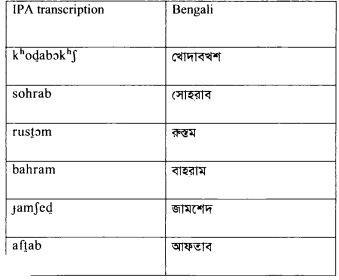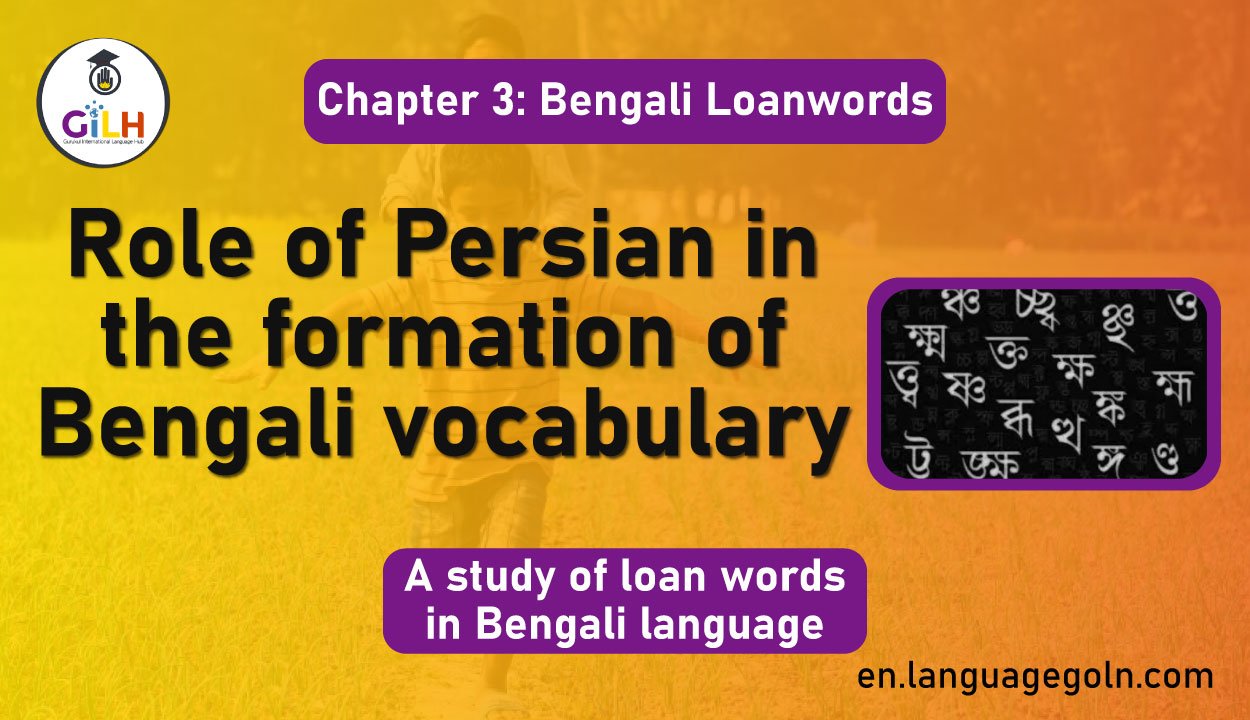Today our topic of discussion is – Role of Persian in the formation of Bengali vocabulary
Role of Persian in the formation of Bengali vocabulary
Due to centuries of contact with foreign languages, Bengali adopted a great number of Persian words. These words took the place in Bengali language in various ways, for instance, in social manners and etiquette, cultural activities, daily activities, and in administrative sectors.
Particularly in the language of our law and justice, the role of Persian and Arabic language, that is Perso-Arabic elements, is undeniable. In this way the power of Bengali language has been increased in a high level.
Besides, the usage of Arabic and Persian words in the writing of middle period Bengali poets is noteworthy. The poets and novelists of Bengali literature exquisitely used those words in their writing which ultimately increased the power of expression of Bengali.
There is no accurate number of Perso-Arabic words came in Bengali language. Muhammad Shahidullah mentioned about the number of Perso-Arabic words exist in this language
More than two thousand Persian words and Arabic and some Turkish words entered in Bengali for 600 years of Muslim influence” (Shahidullah, 1998: 39).
There are about 2500 Persian words in Bengali now’ (Chatterjee, 1999: 18). Here are 2641 Perso-Arabic words listed at the end of this study. These are the words which Bengali mass people use in their daily life in many ways.
Regarding the number of Perso-Arabic elements in Bengali vocabulary, we can say in support of the references mentioned earlier, that there are 2641 Perso Arabic words, even more, If we focus on the vocabulary, we will see that the Perso-Arabic words entered into this language as the words of particular classes.
For instance, words related to territory and war, law and justice, religion, architecture, education etc. Regarding the classes linguists have their own opinions. ‘Words received from Persian can be divided into seven parts (Shahidullah, 1998: 55) These are-
1. Kingdom and war
2. Law and justice
3. Religion
4. Education
5. Elements of civilization
6. Nation and business
7. General materials
On the other hand Chatterjee also classified Persian words into seven classes (Chatterjee, 1999).
These are
1. Royal court, war and hunting
2. Law and justice, tax and administration
3. Muslim and religion
4 Culture, education, literature and arts
5. Industry and luxury as general civilization
6. Foreign nation
7. Natural things and daily life materials
Besides, Bengali adopted a number of words related to surname and title.
Year is replaced by century because of royal power. In Hindu society, some titles entered because of royal power. Even a Brahman has been still bearing these royal title considering them prestigious giving up his prejudice Titles are Ikan (Turkish), mollik (Arabic), /fork’ell. forkar.
/mojumdar, talukdar, haldar (hawaladar), moholanob.f. Ikafnob. mirbohor, mur.ji (Arabic). /cakladar, paroldari jkor, bok’ji (Turkish) etc. Irrespective of Hindu and Muslim, Bengali still use almost all of these (Shahidullah, 1999: 260).
On the other hand, Sikder mentioned about the Persian loanwords exist in Bengali, Along with the words of the element of civilization and fruits, religion, law and justice. tax and war, he mentioned about few slang words came from Persian.
/bahbal,/faba (fad baj). /spsos/ (afsos). For the influence of royal language, some words of emotion are used in Bengali, like /albota, /kub etc. Few slang words also entered in Bengali language: for instance: /paji, /badmacf. /haramjada. /ahmak, bayjay etc’ (Sikdar 2002: 193).
Therefore, regarding the number of the classes of Perso-Arabic words in Bengali vocabulary we can say, there are basically 15 kinds of Persian words in this language. These are –
1. Kingdom, royal-court and war
2. Law and justice
3. Muslim and religion
4. Education and culture
5. Daily usable words and household utensils
6. Foreign nation
7. Elements of civilization and architecture
8. Business and trade
9. Foods and drinks
10. Tax and administration
11. Natural things
12. Surname and title
13. Emotional expression
14. Muslim name
15. Slang words
Kingdom, royal-court and war:
Due to the rule of Turks and Mughals, a lot of word related to kingdom, royal court and war entered in Bengali, Especially the words related to war entered because Turkish rulers had a great impact on the sector of war in Indian subcontinent.
The mark of victory of the Turks can be seen in Indian army from the perspective of military power. Doing or teaching martial art was not only limited to any sector or cast because of Turkish in fluence. This education was open for the mass people’ (Roy, 2005: 28).
As a result, we get the following words –
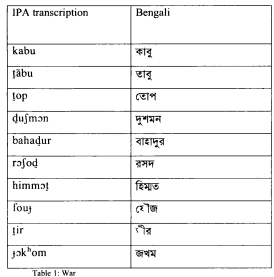
As the governing rule was royal, the following words entered in Bengali
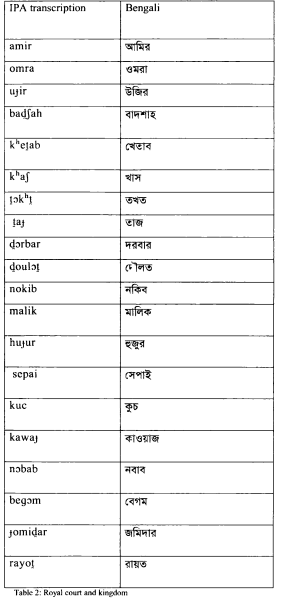
Law and justice: Words related to law, court and justice exist in Bengali vocabulary. For example –
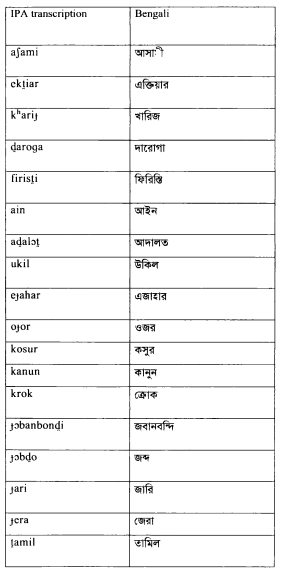
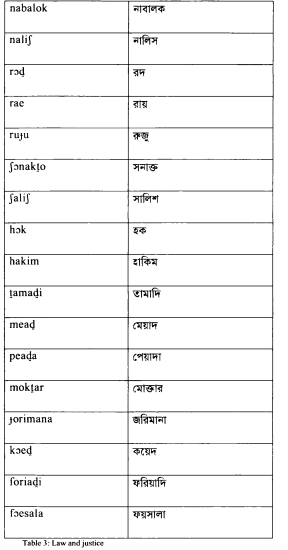
Muslim and religion: Since Persian words entered into Bengali during the Muslim rule, there are lots of religious word and words related to Muslim and Islam. The Turks and the Mughals were
Education and culture:
During the Muslim rule over the Indian subcontinent, the rulers were kind and considerate enough about the education of mass people. Their attempt and initiatives to promote general education for mass people have been seen throughout the history. Consequently, Bengali people grabbed many Persian words related to education, culture, manner and courtesy. For instance –
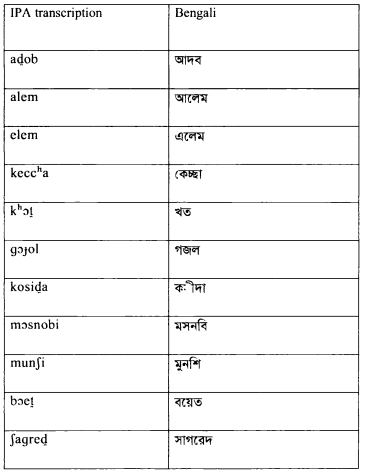
The sultans of Delhi brought a new architectural design by building tombs, mosques, cities, forts etc in 13th century. Those were mod.fied in course of time. They did various experiments by decorating those with arch, ornamented threshold, tower which reached to a special height during the Lodi dynasty.
This is an extraordinary contribution to the Indo-Islamic architecture on the land of India’ (Roy, 2005: 367).
Especially the Mughal architectures are still matchless. The following words prove their amateur mind-
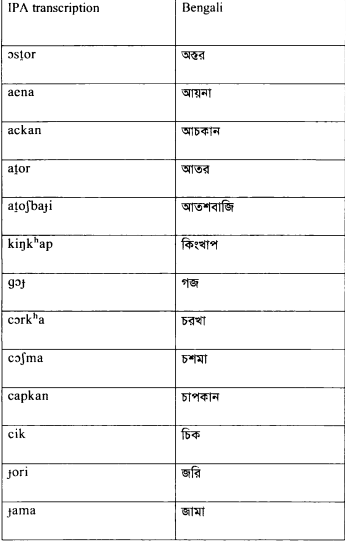
Business and trade:
At the beginning of Muslim rule, that is, after the establishment of Sultani reign in the subcontinent, mills and factories were started to be made.
As soon as the Sultani rule was started to spread, building cities and producing various types of goods according to the demand of the rulers were started in the North India.
As a result, goods which were produced by the slaves, crefismen, local and foreign artisans at the starting in the cities, were suitable for the internal trading. Trading was going on with the foreign countries because of the increasing number of cities and its population’ (Roy, 2005: 336).
From the above quotation we can understand that business and trading were current on that period, even with the foreign countries. As a result, words related to trade entered into Bengali. For example –
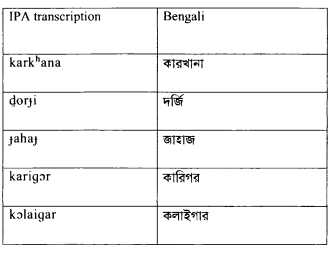
Muslim name: There are countless words came from Perso-Arabic origin have been using as the name of people. For instance-
